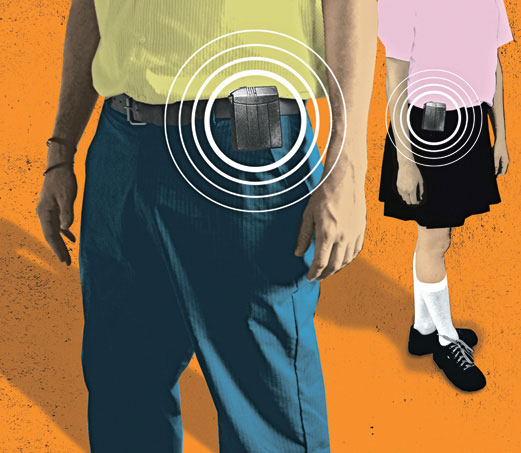 It’s not always a pretty scene in the delivery room. It can be stressful and scary watching the birth of a new ratings platform. Ten years ago, that’s where I was I was hanging out when Arbitron officially declared that PPM was the new currency for the nation’s biggest radio metros.
It’s not always a pretty scene in the delivery room. It can be stressful and scary watching the birth of a new ratings platform. Ten years ago, that’s where I was I was hanging out when Arbitron officially declared that PPM was the new currency for the nation’s biggest radio metros.
Tom Taylor’s NOW column yesterday chronicled the story of the Portable People Meter and radio, a rocky journey that began in Philadelphia, and eventually spread to an additional 47 key U.S. radio markets. I had been blessed with strong clients in Philly for many years now – the iconic WMMR and its successful sister WMGK, so I was blessed with a ringside seat for PPM’s debut.
That gave me an up close view of the PPM rollout, as well as being present at a number of orientations, meetings, conference calls, and other training sessions. Later that year, Arbitron held its annual Consultant Fly-In in Annapolis, a very well-attended event because of the advent of an exciting new ratings system and the anticipation of a steep learning curve. Everyone showed up to soak up everything they could about this breakthrough new research methodology.
Many in radio will tell you this first decade for PPM has been difficult and challenging at best, and problematic at worst. The promise of this methodology captivated many in radio, frustrated by the crude paper and pencil diary system. Many – including me – were excited about the possibilities of a new ratings ecosystem that measured real-time listening rather than recall, providing accountability and clarity for an industry sorely in need of validation.
Former CBS Radio chieftain, Dan Mason, expressed his regret at last year’s Radio Ink’s Hispanic Radio Conference. As he explained, “When PPM came out, I was jumping up and down. I was all for it. I didn’t listen to (the late ratings analyst) Roy (Shapiro). I wanted to make radio this shiny new thing.”
He wasn’t alone. The great PPM hope was that listening and engagement would increase, accompanied by positive reactions from the ad community, leading to more sales and ultimately, greater credibility and respect for a medium that had fallen behind in the measurement game.
Sadly, none of that has happened.
In many ways, the PPM system was hit by a perfect storm of bad circumstances and “unfortunate events” that go on to this day. Remember that as the system roll-out was underway, the worst recession of our lifetimes hit. Any chance the Portable People Meter would generate higher sales was dashed by that giant sucking sound of known as the near-collapse of the American economy, and with it, ad sales. Market advertising caps were slashed during those times, and for the most part, have yet to fully recover.
Then there was the rise of digital media and other competitive technologies and gadgets that have taken their toll on a radio that is like a huge tire with  a slow leak. At precisely the time when radio might have been extolling its virtues thanks to a new real-time measurement system, Pandora, SiriusXM, Google search, and Facebook were stealing a growing share of the media advertising thunder.
a slow leak. At precisely the time when radio might have been extolling its virtues thanks to a new real-time measurement system, Pandora, SiriusXM, Google search, and Facebook were stealing a growing share of the media advertising thunder.
And over time, some of the foibles of PPM emerged – poor headphone measurement and even encoding inconsistencies, brought to light by the engineering wizards at The Telos Alliance who introduced Voltair to the market just a few years ago. That event shook Nielsen and PPM to its core. No longer was it about dogs wearing meters or PPMs attached to ceiling fans. Telos called into question the system’s ability to accurately hear all the radio around it – a problem that “motivated” Nielsen to come up with its own CBET solution.
And all the while, both Arbitron and Nielsen began to confirm the reality that a meter or two could throw an entire market’s ratings out of whack. Then, there were the meter malfunctions, weighting issues, and other snafus that have only made a tough road even more arduous, right up to yesterday’s cheery revelation about an “isolated processing issue” that may have caused “slight variation in the data” for January Week 1 ratings.
Not surprisingly, first Arbitron, and later Nielsen, suffered from an onslaught of client dissatisfaction and even remorse. Some radio pundits and broadcasters openly wish it were possible to go back to the diary. But that’s not the answer. As attention spans have no doubt shortened in the past decade and entertainment options have exponentially increased, hoping diarykeepers remember to write down your radio station is a misguided belief. And on the agency side, a system that is dependent on consumers writing down their radio listening on paper diaries.
But despite these external conditions and other bumps that come from breaking in a new ratings system, has radio gotten better since the advent of the meter? Most would argue to the contrary, due in part to overreaction to the minute-by-minute measurement provided by PPM. Some of that thinking was driven by Arbitron in the earliest days of metered measurement, pointing out those EKG-like lines that dipped for commercials, new music, and yes, DJ talk.
As a result, Better has been replaced by safer. And while that may have generated consistent ratings in the short term, radio may be mortgaging its future, opting for bland sounding radio in a world where new and exciting choices abound.
So, here it is a decade later, and we’re often disappointed, mostly wearied, and hopefully a bit wiser about the ratings currency known as PPM. Despite its many speed bumps with the MRC, the Personal People Meter is the ratings of record. And in a world where we openly debate the idea of repeal and replace, we ought to be thinking repair. That means tackling issues like headphone measurement, not giving up on “measuring everything,” and pushing for better quality control as a starting point.
As Tom Taylor wrote in yesterday’s NOW newsletter, PPM “is a fact of life.”
So, as metered measurement enters its second decade, it’s on the radio industry to make the best of it, pressure Nielsen to make the system better, improve its programming and its brands, and air fewer commercials that aren’t embarrassing and erosive.
And as for all that PPM celebrating, excuse me, but I’ll pass on the cake.
- Why Every CEO Needs A Solid Tech IQ - January 24, 2025
- Why Do Radio Commercials Have To Suck? - January 23, 2025
- Broadcast Radio In 2025: A Word Cloud Or Word Salad? - January 22, 2025




SPOT ON. (Pun intended).
Thanks, Dave. A little cake wont hurt you. 🙂
Sad. Once upon a time you could look at one page of an Arbitron book and quickly see more information from larger samples for every radio station in every market. We’ve come a long way, baby. Backwards. http://www.broadcastideas.com
That we have, Clark.
Good stuff
Thank you!
PPM data comes with this disclaimer: “PPM ratings are based on audience estimates and are the opinion of Nielsen and should not be relied on for precise accuracy or precise representativeness of a demographic or radio market.”
’nuff said.
C’mon, Dave, who reads the fine print? 🙂
i know, i know. but the data is so bad that Nielsen’s lawyers require the legal cover of a disclaimer.
frustrated programmers use flawed data to adjust programming to conform to distorted realities. and buyers doubt our credibility when they compare granular online data analysis with the flimsy guestimates we put in front of them.
radio gets what it deserves for letting this horrible system define reality and success.
Sad…but true.
We could debate this forever. While the technology is generally accurate the sample size is too small. That said, you are spot on about how radio has reacted. In general radio has played to the meter rather than the audience. Safe playlists in the era of Spotify are not a benefit. Killing real content and engagement in an era of content and engagement does not make radio more attractive. Somewhere, somehow we forgot that this is still show business. As an advertising medium radio still works – and works well. As an entertainment medium it has come up short.
Steve, there’s thinking in the short-term (the spring book) and the long-term (a year, two, or five from now) that are both essential to survival. Problem is, most radio stations are pragmatically focused on the former. Future planning in the business is still a rarity, and that’s not a formula for success in this environment. Thanks for the insightful comment.
My name is RobinJill Kozaczka and i use to wear the metors and i will like to get started with it again.
Robin, Nielsen (the company that issues the meters) doesn’t take volunteers. But feel free to contact them anyway. http://www.nielsen.com